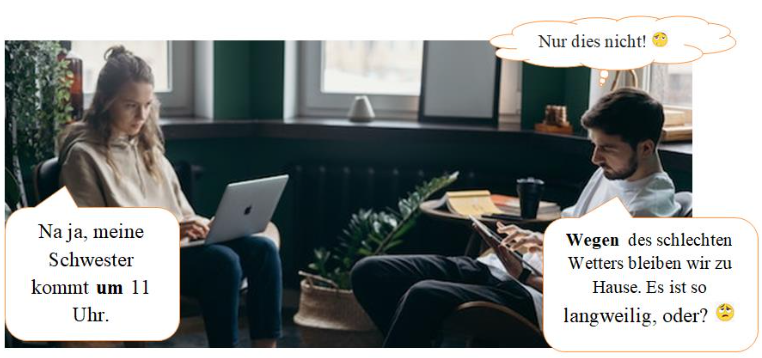In this lesson, you will learn all about prepositions in German, what they are, what types of prepositions exist in the German language, and for each type of preposition you will receive a brief description and a link to the lesson, where you can learn more about individual prepositions.
Thank you for reading this post, don't forget to subscribe!CONTENTS
What are prepositions in German?
What prepositions are there?
Prepositions of place
Temporal Prepositions
Prepositions of Manner
Prepositions for a cause
Joining a preposition with an article
What are prepositions in German?
Prepositions are a small group of little words which typically occur before a noun phrase and help to link it to the rest of the sentence. These prepositional phrases often convey ideas related to time, place, and direction, and they often depend on a preceding noun, adjective or verb.
For example:
Das Bild hängt an der Wand. – The picture hangs on the wall.
Seit zwei Monaten wohnen wir in einem alten Haus in Berlin. –We have been living in an old house in Berlin for two months.
Um halb acht gehen wir ins Kino. – We’re going to movies at half past seven.
Click on:
Grammar Contents
What prepositions are there?
We distinguish:
Prepositions of place (Lokale Präpositionen)
Prepositions of manner (Modale Präpositionen)
Prepositions of time (Temporale Präpositionen)
Prepositions of cause (Kausale Präpositionen)
Prepositions of place
Prepositions of place describe not only place but also movement.
They answer the question: Wo?, Wohin? and Woher?
Wo seid ihr? – Wir sind im Garten. Der Garten ist hinter dem Haus.
The most common prepositions for the place are: an, auf, aus, bei, hinter, in, neben, von, vor, zu.
Go to lesson: Prepositions of place/ Lokale Präpositionen
Prepositions with dative and accusative / Wechselpräpositionen:
The following prepositions require the dative and accusative: an, auf, hinter, in, neben, unter, über, vor, zwischen.
A question with an interrogative word wo? (where?) is answered with a preposition with a dative case, and the verb can indicate rest or movement in a certain space.
Examples:
Wo sind Mona und Jan? – Mona und Jan sitzen in dem Garten.
Wo seid ihr? Wir sind in der Schule.
Wo spielen die Kinder? – Die Kinder spielen auf der Straße.
A question with an interrogative word wohin? ( Where to?) is answered with a preposition with an accusative case, when the verb expresses a movement or an action directed towards some goal.
Examples:
Wohin gehen Mona und Jan? -Mona und Jan gehen in den Garten.
Wohin geht ihr? -Wir gehen in die Schule.
Wohin gehst du? -Ich gehe in die Stadt.
Go to the lesson: Prepositions two ways (Dative and Accusative) / Wechselpräpositionen
Prepositions of time
Prepositions of time describe what else but time, for example, when something happens or how long something lasts. They answer the question: Wann? and Wie lange?
Examples:
Wann kommst du nach Hause? – When are you coming home?
Ich komme um 17 Uhr nach Hause. – I get home at 5 pm.
The most common prepositions of tima are: an, ab, bis, gegen, in, nach, seit, um, von, vor.
Go to the lesson: Prepositions of time/ Temporale Präpositionen
Prepositions of manner
Prepositions of manner describe how or in what way something happened. They answer the question: Wie? The most common suggestions for the method are: auf, für, gegen, mit, ohne, statt.
Examples:
Wie kommst du zur Arbeit? – How do you get to work?
Ich fahre mit dem Bus. – I’m travelling by bus.
Go to the lesson: Prepositions of manner / Modale Präpositionen
Click on:
Grammar Contents
Prepositions of cause
Prepositions of cause describe the reason or purpose of an action. Why does something happen? (Warum / Wieso / Weswegen passiert etwas?) The most common prepositions for the cause are: anlässlich, beaut, dank, trotz, ungeachtet, wegen, … zufolge
Examples:
Wir müssen wegen des Streiks länger arbeiten. – We have to work longer because of the strike.
Dank seiner Hilfe habe ich einen besseren Job bekommen. – I got a better job thanks to his help.
Go to the lesson: Prepositions of Cause/ Kausale Präpositionen
Merging of preposition and article /Zusammensetzung mit Artikeln
Some prepositions are joined with the definite article.
an + dem = am
an + das = ans
bei + dem = beim
in + dem = im
in + das = ins
von + dem = vom
zu + dem = zum
zu + der = zur
Go to the lesson: Merging of preposition and article / Zusammensetzung mit Artikeln
See more:



